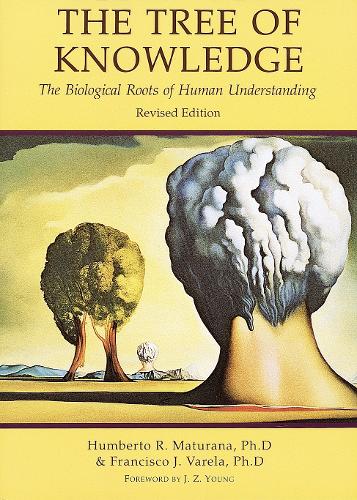
Tree of Knowledge: The Biological Roots of Human Understanding
(Paperback)
Publishing Details
Tree of Knowledge: The Biological Roots of Human Understanding
By (Author) Humberto R. Maturana
By (author) Francisco J. Varela
Foreword by J. Z. Young
Shambhala Publications Inc
Shambhala Publications Inc
15th August 1992
1st April 1993
United States
Classifications
General
Non Fiction
Cognition and cognitive psychology
Child, developmental and lifespan psychology
Philosophy and theory of education
Popular psychology
153
Physical Properties
Paperback
272
Width 167mm, Height 234mm, Spine 15mm
482g
Description
With the help of illustrations and examples from biology, linguistics and social and cultural phenomena, this book shows that the process of learning is not a means of knowing an absolute world of facts, but is rather an active process which itself creates the world of human experiences. To convey this, the authors examine cognition in all its facets, exploring topics such as the nature of scientific exploration, the organization of living things, evolution, language and the emergence of self-awareness. The authors maintain that the nature of cognition has important social and ethical consequences, for the only world that we humans can have is one that we bring forth together the action of our coexistence. Written for a general audience, this book invites readers to let go of their preconceptions and gain fresh insights into what it means to be human.
Reviews
"A refreshing and new approach to cognitionone which has dramatic cultural, social, and ethical ramifications. . . . While stimulating the imagination of readers it has, however, not received the scholarly acclaim it richly deserves." Journal of Religion and Psychical Research
"A book with great breadth and ambition . . . In the age of specialization, it is refreshing to come across a book with conceptual breadth and originality." Contemporary Psychology
"An important milestone in our current efforts to recognize that science is not value-free, and that fact and value are inevitably tied together."Morris Berman, author of Coming to Our Senses
"A beautiful and clearly written guide to thought and perceptionsomething that, like life itself, we take for granted but do not understand. The authors were the pioneers and are now the authoritative figures in the science of cognition: their book is rewarding, thorough, and very readable to anyone curious about the mind and the way that it works."James Lovelock, author of Gaia: A New Look at Life on Earth
"The ideas presented in this book are radical and exciting, disturbing and challenging. For the first time we are shown the outlines of a unified scientific conception of mind, matter, and life. The fruits of Maturana and Varela's Tree of Knowledge include the central insight that cognition is not a representation of the world 'out there,' but rather a 'bringing forth of the world through the process of living itself,' and the stunningly beautiful conclusion: 'We have only the world that we can bring forth with others, and only love helps bring it forth."Fritjof Capra, author The Tao of Physics
Author Bio
Humberto R. Maturana, Ph.D., is a biologist who teaches at the University of Chile. He is also co-author with Dr. Varela of Autopoiesis and Cognition: The Realization of the Living.
